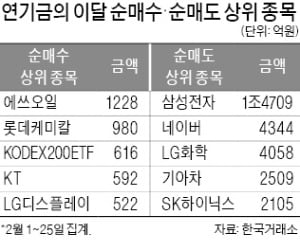Pension funds, which have been net selling for the 41st day in the securities market, are steadily buying economically sensitive and value stocks while reducing the share of stocks.

According to the Korea Exchange on the 25th, pension funds bought 122.8 billion won worth of S-Oil from the beginning of the month to this day. It is the stock that pension funds bought the most during this period. Subsequently, Lotte Chemical (98 billion won), KT (59.2 billion won), LG Display (52.2 billion won), Samsung Life Insurance (39.6 billion won), and HMM (29.5 billion won) were also net purchases. The Codex 200 Listed Index Fund (ETF) also bought 61.6 billion won worth, betting on a further rise in the KOSPI.
During this period, Samsung Electronics (1.4709 billion won), Naver (434.4 billion won), and LG Chem (405.8 billion won) were sold intensively. These are the stocks that have hit the stock market until recently in fields such as semiconductors, non-face-to-face and batteries. The 12-month leading stock price-earnings ratio (PER) of the top 1 to 3 net buying stocks is 8.2~19.0x, lower than the 3rd net selling (15.4~38.3x). It is restructuring its portfolio around value stocks.
Recently, the sale of pension funds has been weakening. In the second week of January, net sales were averaged 5113 billion won a day, but in the fourth week of February (22-25), it fell to 158.9 billion won. On this morning, the market started with net purchases and once raised the scale of net purchases to 150 billion won, it switched to net selling at 3 pm. Kyobo Securities Research Center Director Kim Hyung-ryul said, “If someone sells unilaterally, and the flow of buying others continues, the stock market is bound to be unstable.” Ko Tae-bong, head of Hi Investment & Securities Research Center, said, “The KOSPI index fell a lot the day before, and as a result, the need to reduce the share of stocks decreased, so it would have ended up selling approximately 30 billion won. He explained.
Reporter Yang Byung-hoon [email protected]
Ⓒ Hankyung.com prohibits unauthorized reproduction and redistribution
